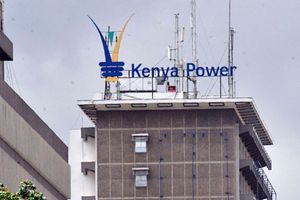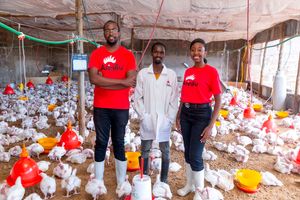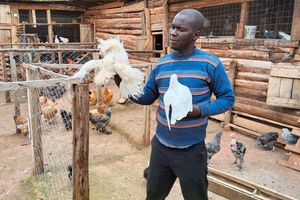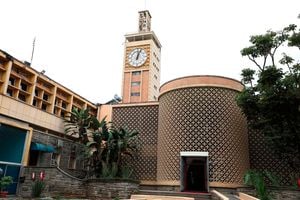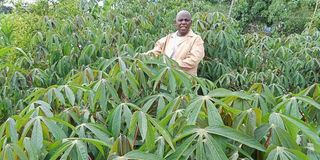
John Maina, a farmer from Laikipia West Sub-County, on his cassava farm. Farmers are turning to the Village Savings and Loans Association for easy capital to invest in orphaned high-value crops.
Village Savings and Loan Associations or VSLAs are aiding the fight against hunger in parts of semi-arid northern Kenya as members embrace cassava and other “orphaned” crops.
In Laikipia County, thousands of farmers, who have relied on maize and beans as staples for many decades, have found easy access to investment capital and are now turning to indigenous drought-resistant, high-value crops.
Erratic weather patterns and global warming have necessitated a rethink in the production of food crops.
In the village saving model, members make weekly contributions of a set amount.
A member can borrow and repay a certain amount of money at an agreed interest rate without being asked for collateral.
Most group members use the borrowed amounts to invest in high-value drought-resistant crops, which are becoming popular with diet-conscious consumers in Kenya.
Previously neglected crops such as njahi (black beans or dolichos), pigeon peas, cassava, indigenous vegetables, sorghum and a fast-maturing and iron-rich bean variety called nyota are quickly becoming the choice of many farmers.
“We formed our VSLA early this year. I have borrowed a total of Sh23,000 to date,” says John Maina, a farmer on the outskirts of Rumuruti town.
“I have used some of this money to invest in the farm. I used the remaining amount on a new 10,000-litre tank that stores rainwater. The programme is supported by the Laikipia devolved government.”
Maina suffered heavy losses when his traditional crop – maize – dried up due to little rain last year.
He, however, harvested 100 kilogrammes of dolichos from a 30 by 15-metre plot.
“It was exciting and an eye-opener. I have now increased the area under njahi to a quarter an acre and expect to harvest at least 200 kilogrammes,” Maina says.
“From that, I can make about Sh30,000. I will still borrow from our VSLA and expand land under these crops as I intend to abandon maize. My focus is on njahi, pigeon peas and cassava, which I have already planted on a section of my two-acres for experimental purposes.”
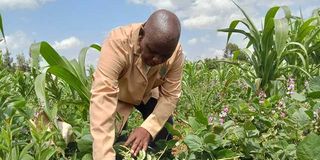
John Maina on his Njahi farm in Laikipia County. Easy access to finance has encouraged farmers to start growing neglected crops such as cassava.
Maina’s VSLA, known as Songa Mbele, has 30 members comprising men, women and youth.
Every member contributes a minimum of Sh500 a week. The group’s current savings stand at almost Sh200,000. A member can borrow whatever he or she qualifies for and repay with an interest of 10 percent.
Songa Mbele VSLA Chairperson Susan Mwangi says members include Village-Based Advisers (VBAs), the equivalent of national or county government agricultural extension officers.
The advisers provide much-needed information on crop management practices.
Ms Mwangi says the VBAs got training through the support of the Dutch Embassy in Nairobi, which is involved in a programme called Laikipia, Isiolo, Samburu Transforming the Environment through Nexus or LISTEN.
A shortage of agricultural officers in Laikipia and neighbouring counties, and the unpredictable weather contribute to reduced crop production, Ms Mwangi says.
Farmers fail to get timely advice on pests and disease control as well as soil testing and how to improve soil fertility.
Almost all of Kenya's devolved governments suffer from a shortage of extension workers. Agronomists who leave through natural attrition are rarely replaced, leaving budding farmers to seek advice from agrovets and other unreliable sources.
According to the UN Food and Agricultural Organization (FAO), one extension officer is expected to serve 400 farmers. There are about 100 extension officers in Laikipia County serving about 105,000 farmers.
Peter Githiri, an official with the LISTEN project, says some 157 VBAs have been trained to fill the gap and are accessible to the farmers though they do not receive a stipend for their services.
“They offer advice on good agricultural practices such as crop rotation, mulching, inter-cropping and regenerative agriculture, helping in climate change adaptation,” Githiri says.
“VBA are members of the VSLAs. They are well positioned to know about weather forecasts and advise the members to purchase climate-smart crops for resale or advance the same on credit terms.”
Christine Koech, one of the VBAs operating in Lorian location and a member of the local VSLA, says she stepped in to fill the gap of extension officers as only one devolved government official is serving three wards.
“Unfortunately, reaching farmers is difficult as I have not been assigned a car or motorcycle,” Ms Koech says.

